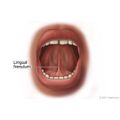Condition Basics
What is tongue-tie?
Tongue-tie happens when the tissue that attaches the tongue to the bottom of the mouth (lingual frenulum) is too short. This problem is present at birth. It can limit the movement of the tongue. Some children don't have problems. For others, it may cause problems with feeding, speech, and social interactions.
What causes it?
The cause of tongue-tie isn't always known. It can run in families or may occur in babies who have other problems that affect the mouth or face, such as cleft palate.
What are the symptoms?
Many children with tongue-tie don't have symptoms. The tissue either stretches as the child grows, or the child adapts to the tongue restriction. But some children may have:
- Trouble latching and sucking during breastfeeding. Bottle-fed babies often don't have feeding problems. That's because drinking from a bottle uses different mouth movements than breastfeeding.
- Gaps or spaces between the front lower teeth.
- Speech problems. This may happen when the tip of the tongue cannot rise high enough to make some sounds clearly. These sounds may include t, d, z, s, th, n, and l.
- Personal or social problems. The limited tongue movement can make it hard to do certain things, such as clean food off the teeth with the tongue.
How is it diagnosed?
Your doctor will do a physical exam of your child's mouth and ask about any symptoms. If you are trying to breastfeed, your doctor may also examine your breasts and watch your child trying to breastfeed. In an older child or adult, the doctor may check the shape and movements of the tongue.
How is tongue-tie treated?
If your baby has tongue-tie and is feeding okay, you may choose to wait and see if their lingual frenulum stretches on its own. You can also:
If tongue-tie causes problems with eating, speech, or social interactions, the doctor may release the tissue. This procedure is called a frenotomy or a frenuloplasty. The doctor clips the lingual frenulum and closes the wound with stitches. The doctor may teach your child how to do tongue exercises. These can help with tongue movement.
Credits
Current as of: July 31, 2024
Current as of: July 31, 2024






